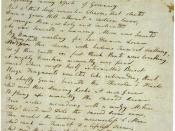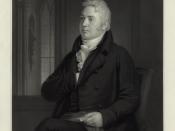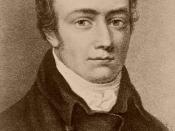Transformation due to the undertaking of an imaginative journey is a certainty for every person. After an imaginative journey the mind frame of the person who undertook the journey has altered due to a new understanding, therefore they are unable to return to the same mind frame that they previously had. Similarly, the imaginative journey that Coleridge embarks on during the poem Frost at Midnight transforms his mind. Coleridge begins the journey enclosed and pessimistic although after the speculation of his child's future he becomes optimistic and open minded. However, in Margaret Atwood's poem Journey to the Interior no imaginative journey is undertaken, rather the speculation of obstacles that can prevent discovering the inspiration for a journey into the imagination occurs and results in the lack of her transformation. Peter Howitt's Sliding Doors focus on the imaginative speculation about what the future could hold if a split-second moment took you down one path rather than another.
The main character diverges into parallel storylines and is transformed due to the different experiences she undergoes after missing or catching a train. Through these three pieces it is evident that after the imagination is summoned and a journey is undertaken it is impossible to remain unchanged.
Due to Coleridge's initiation of a journey into the imagination in Frost at Midnight, Coleridge's learns how to expand his mind, transforming from a cynical ruminator to an enthusiastic speculator. Romantic pantheism, adopted in Coleridge's poetry, means that only through the solitude of 'midnight' can he begin his imaginative movement, as 'solitude...suits abstruser musings'. Through this meditative state, Coleridge begins to move from the reality of his location and delve into imaginative recreation of his past. This remembrance of his schooling years at boarding school is presented by Coleridge as a detrimental experience for him. Coleridge's...



Great!!
I really needed an example of how to analyse a film as an additional material. I felt you covered Sliding Doors quite well in your essay and i was amazed by the links you made to the imaginative journey. Well done! This was also a well structured and thoughful essay.
1 out of 1 people found this comment useful.